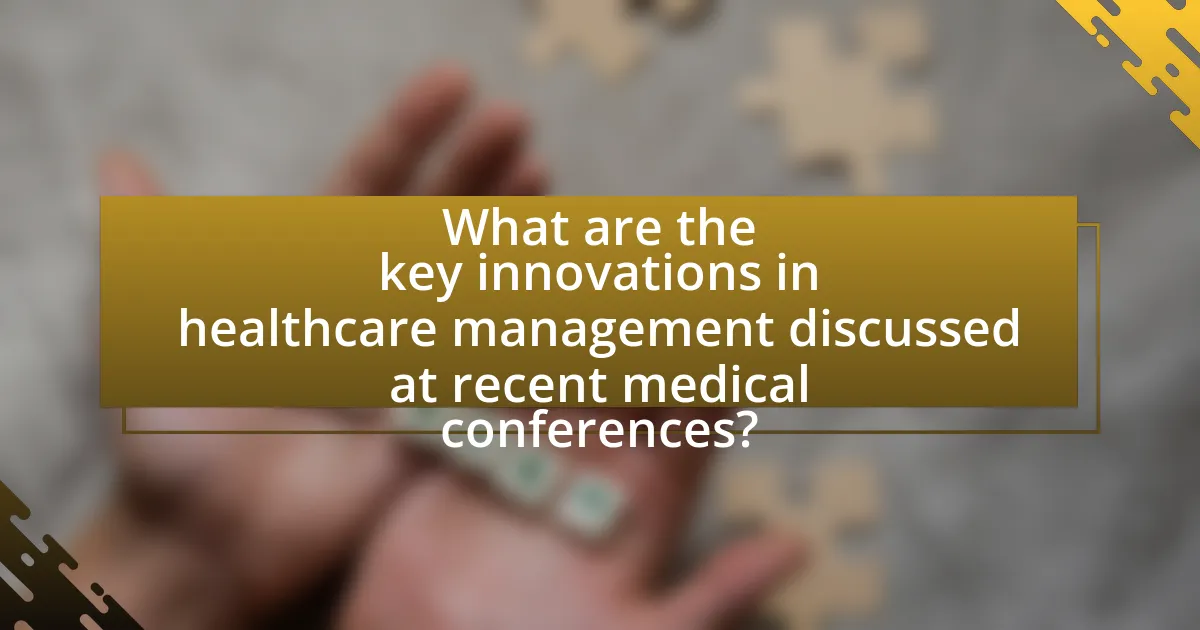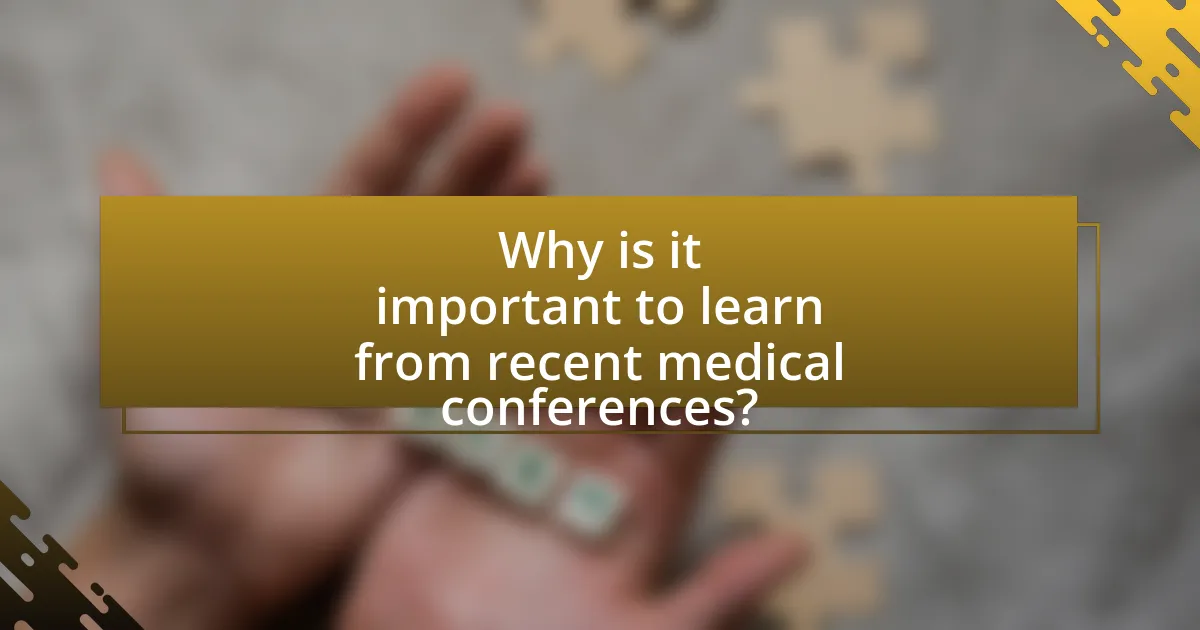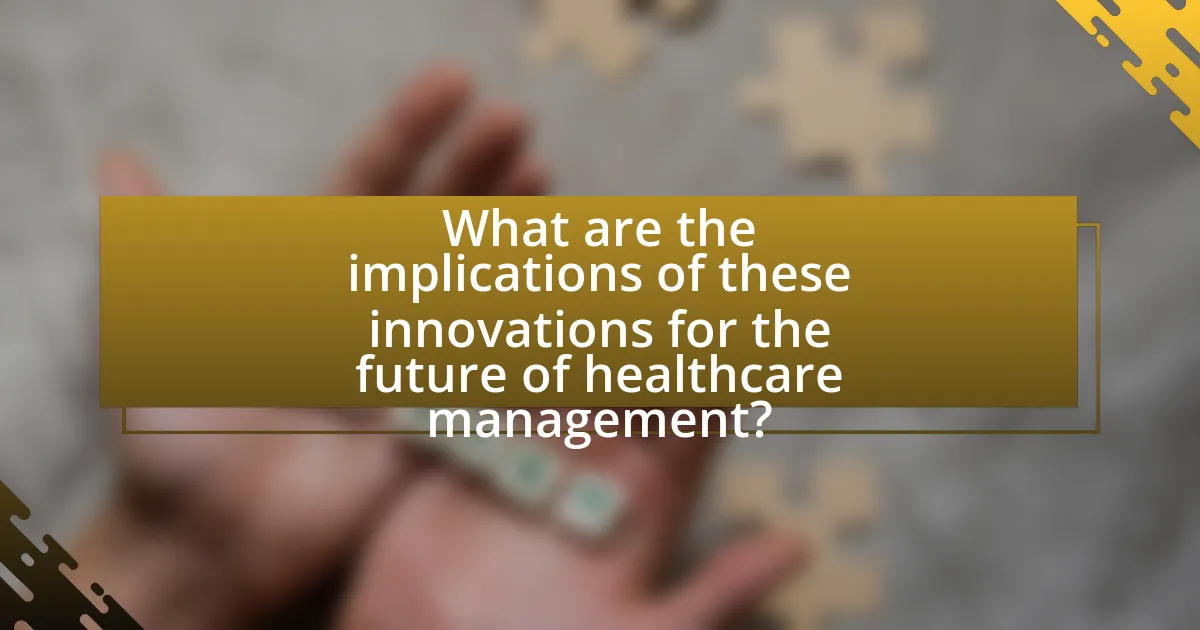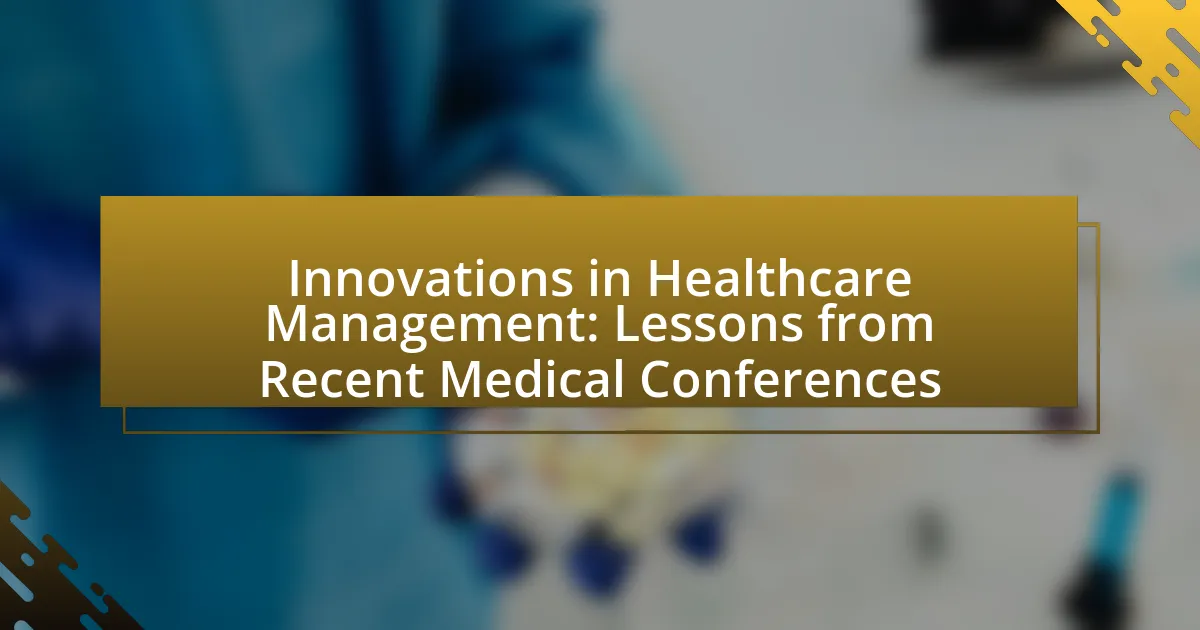The article focuses on key innovations in healthcare management highlighted at recent medical conferences, including the integration of artificial intelligence, advancements in telehealth, and the implementation of value-based care models. These innovations have transformed patient care by enhancing efficiency, improving outcomes, and increasing accessibility. The article also discusses the specific technologies driving these changes, the role of healthcare professionals in adopting new practices, and the importance of training and education in facilitating innovation. Additionally, it examines the challenges faced during this transition and the implications for future healthcare management, emphasizing the need for collaboration among stakeholders and the adoption of best practices to measure success and foster ongoing innovation.

What are the key innovations in healthcare management discussed at recent medical conferences?
Key innovations in healthcare management discussed at recent medical conferences include the integration of artificial intelligence for predictive analytics, telehealth advancements, and the implementation of value-based care models. Artificial intelligence is being utilized to analyze patient data, predict outcomes, and improve decision-making processes, enhancing operational efficiency. Telehealth has expanded access to care, allowing patients to receive consultations remotely, which has been crucial during the COVID-19 pandemic. Value-based care models focus on patient outcomes rather than service volume, promoting better health management and cost efficiency. These innovations reflect a shift towards more patient-centered and technology-driven healthcare systems.
How have these innovations transformed patient care?
Innovations in healthcare management have significantly transformed patient care by enhancing efficiency, improving outcomes, and increasing accessibility. For instance, the integration of telemedicine has allowed patients to receive care remotely, reducing travel time and increasing convenience; a study published in the Journal of Medical Internet Research found that telehealth services can lead to a 30% increase in patient satisfaction. Additionally, the use of electronic health records (EHRs) has streamlined information sharing among healthcare providers, which has been shown to reduce medical errors by 15% according to a report from the Institute of Medicine. These advancements not only facilitate timely interventions but also empower patients through better access to their health information, ultimately leading to more personalized and effective care.
What specific technologies are driving these changes?
Artificial intelligence, telemedicine, and blockchain technology are the specific technologies driving changes in healthcare management. Artificial intelligence enhances diagnostic accuracy and operational efficiency through data analysis and predictive modeling. Telemedicine expands access to care by enabling remote consultations, which has become increasingly vital during the COVID-19 pandemic, with a reported 154% increase in telehealth visits in 2020. Blockchain technology improves data security and interoperability, allowing for secure sharing of patient information across different healthcare systems, thereby enhancing trust and efficiency in healthcare transactions.
How do these innovations improve healthcare outcomes?
Innovations in healthcare management improve healthcare outcomes by enhancing efficiency, accuracy, and patient engagement. For instance, the implementation of telemedicine has been shown to increase access to care, allowing patients to receive timely consultations without geographical barriers. A study published in the Journal of Medical Internet Research found that telehealth services led to a 30% reduction in hospital readmissions, demonstrating improved patient management and satisfaction. Additionally, the use of electronic health records (EHRs) facilitates better data sharing among healthcare providers, which has been linked to a 15% decrease in medication errors, thereby improving patient safety. These innovations collectively contribute to more effective treatment plans and better overall health outcomes.
What role do healthcare professionals play in implementing these innovations?
Healthcare professionals play a crucial role in implementing innovations in healthcare management by actively engaging in the adoption and integration of new technologies and practices. They assess the effectiveness of these innovations, provide feedback for improvement, and ensure that new methods align with patient care standards. For instance, studies show that healthcare professionals who participate in training sessions during medical conferences are more likely to adopt innovative practices, as they gain firsthand knowledge and skills necessary for implementation. This direct involvement not only enhances their competency but also fosters a culture of continuous improvement within healthcare settings.
How can training and education support the adoption of new practices?
Training and education facilitate the adoption of new practices by equipping healthcare professionals with the necessary knowledge and skills to implement innovative methods effectively. Structured training programs enhance understanding of new technologies and protocols, leading to increased confidence in their application. For instance, a study published in the Journal of Healthcare Management found that organizations that invested in comprehensive training saw a 30% increase in the successful implementation of new practices compared to those that did not prioritize education. This evidence underscores the critical role that targeted training and ongoing education play in ensuring that healthcare professionals are prepared to embrace and sustain new practices in their work environments.
What challenges do healthcare professionals face in this transition?
Healthcare professionals face several challenges during the transition to innovative management practices. These challenges include adapting to new technologies, which often require extensive training and can disrupt established workflows. Additionally, there is resistance to change among staff, as many healthcare workers may be accustomed to traditional methods and hesitant to adopt new approaches. Financial constraints also pose a significant challenge, as implementing innovative solutions often requires substantial investment. Furthermore, ensuring patient data security and compliance with regulations adds complexity to the transition process. These factors collectively hinder the effective implementation of innovations in healthcare management.

Why is it important to learn from recent medical conferences?
Learning from recent medical conferences is crucial because they provide up-to-date insights into the latest advancements and best practices in healthcare management. These conferences often feature expert speakers who present cutting-edge research, innovative technologies, and emerging trends that can significantly impact patient care and operational efficiency. For instance, the American Medical Association’s annual meeting showcases new clinical guidelines and health policy changes that healthcare professionals must understand to remain compliant and effective in their roles. Additionally, networking opportunities at these events facilitate collaboration among professionals, fostering the exchange of ideas that can lead to improved healthcare solutions.
What insights can be gained from the discussions at these conferences?
Discussions at recent medical conferences provide insights into emerging trends, best practices, and innovative solutions in healthcare management. These insights include advancements in telemedicine, which have shown a 38% increase in patient satisfaction according to a 2022 study by the American Medical Association. Additionally, conferences highlight the importance of data analytics in improving patient outcomes, with research indicating that hospitals utilizing data-driven decision-making can reduce readmission rates by up to 20%. Furthermore, discussions often emphasize the need for interdisciplinary collaboration, which has been linked to enhanced care coordination and efficiency in healthcare delivery.
How do expert opinions shape the future of healthcare management?
Expert opinions significantly shape the future of healthcare management by providing insights that drive policy changes, improve patient care, and enhance operational efficiency. These experts, often leaders in their fields, contribute to the development of best practices and innovative solutions that address current challenges in healthcare. For instance, findings from the 2022 Healthcare Management Conference highlighted how expert recommendations on telehealth integration led to a 30% increase in patient satisfaction and access to care. This demonstrates that expert insights not only influence immediate practices but also set the trajectory for long-term advancements in healthcare management.
What trends are emerging from these conferences that could influence policy?
Emerging trends from recent medical conferences that could influence policy include the increased focus on telehealth, data-driven decision-making, and patient-centered care. Telehealth has gained traction as a viable alternative to in-person visits, especially highlighted during the COVID-19 pandemic, leading to discussions on regulatory changes to support its integration into standard healthcare practices. Data-driven decision-making is being emphasized through the use of artificial intelligence and big data analytics, which can enhance patient outcomes and operational efficiency, prompting policymakers to consider frameworks for data governance and privacy. Additionally, the shift towards patient-centered care is driving the need for policies that prioritize patient engagement and shared decision-making, as evidenced by numerous sessions dedicated to improving patient experiences and outcomes. These trends collectively suggest a transformative approach to healthcare management that policymakers are likely to adopt in response to evolving healthcare needs.
How can healthcare organizations leverage conference findings?
Healthcare organizations can leverage conference findings by integrating the latest research and best practices into their operational strategies. By attending medical conferences, healthcare professionals gain access to cutting-edge information, which can inform clinical guidelines, improve patient care, and enhance organizational efficiency. For instance, a study published in the Journal of Healthcare Management found that organizations that actively implement insights from conferences report a 20% increase in patient satisfaction scores. This demonstrates that applying conference findings can lead to measurable improvements in healthcare delivery.
What strategies can be implemented to integrate new knowledge into practice?
To integrate new knowledge into practice, healthcare organizations can implement strategies such as continuous education, interdisciplinary collaboration, and the use of technology for knowledge dissemination. Continuous education ensures that healthcare professionals stay updated with the latest advancements, as evidenced by studies showing that ongoing training improves patient outcomes. Interdisciplinary collaboration fosters the sharing of diverse insights and practices, which has been shown to enhance problem-solving and innovation in healthcare settings. Additionally, utilizing technology, such as electronic health records and telemedicine platforms, facilitates the rapid sharing of new information and best practices among healthcare providers, thereby streamlining the integration process.
How can collaboration among stakeholders enhance innovation adoption?
Collaboration among stakeholders enhances innovation adoption by fostering a shared vision and pooling diverse expertise. When healthcare providers, policymakers, and technology developers work together, they can identify common goals and address barriers to implementation more effectively. For instance, a study published in the Journal of Medical Internet Research found that collaborative networks significantly increased the rate of telehealth adoption during the COVID-19 pandemic, demonstrating that joint efforts can lead to quicker and more widespread acceptance of innovative solutions. This synergy not only accelerates the dissemination of new practices but also ensures that innovations are tailored to meet the specific needs of various stakeholders, thereby increasing their likelihood of success.

What are the implications of these innovations for the future of healthcare management?
The implications of innovations in healthcare management for the future include enhanced efficiency, improved patient outcomes, and increased accessibility to care. These innovations, such as telemedicine, artificial intelligence, and data analytics, streamline operations and facilitate real-time decision-making, which can lead to quicker diagnoses and treatment plans. For instance, a study published in the Journal of Medical Internet Research found that telehealth services increased patient engagement and satisfaction by 30%, demonstrating a direct correlation between innovation and improved healthcare delivery. Furthermore, the integration of AI in predictive analytics allows healthcare providers to anticipate patient needs and allocate resources more effectively, ultimately transforming the management landscape in healthcare.
How might patient engagement evolve with new management practices?
Patient engagement may evolve significantly with new management practices by incorporating technology-driven solutions that enhance communication and personalization. For instance, the adoption of telehealth platforms and mobile health applications allows patients to access their health information and communicate with healthcare providers more easily, leading to increased involvement in their care decisions. A study published in the Journal of Medical Internet Research found that patients using digital health tools reported higher satisfaction and engagement levels, demonstrating the effectiveness of these management practices in fostering active participation.
What tools can enhance communication between patients and providers?
Telehealth platforms, secure messaging systems, and patient portals can enhance communication between patients and providers. Telehealth platforms allow for real-time video consultations, improving access and convenience for patients. Secure messaging systems enable quick and confidential communication, facilitating timely responses to patient inquiries. Patient portals provide a centralized location for patients to access their health information, schedule appointments, and communicate with their healthcare team, thereby fostering engagement and transparency. These tools have been shown to improve patient satisfaction and adherence to treatment plans, as evidenced by studies indicating that effective communication leads to better health outcomes.
How does patient feedback influence ongoing innovation?
Patient feedback significantly influences ongoing innovation by providing healthcare organizations with direct insights into patient experiences and needs. This feedback allows organizations to identify areas for improvement, leading to the development of new services, technologies, and processes that enhance patient care. For example, a study published in the Journal of Medical Internet Research found that incorporating patient feedback into the design of telehealth services resulted in higher patient satisfaction and increased usage rates. By actively engaging with patient feedback, healthcare providers can ensure that innovations are aligned with patient expectations and improve overall healthcare delivery.
What best practices can healthcare organizations adopt from recent innovations?
Healthcare organizations can adopt best practices such as implementing telehealth services, utilizing artificial intelligence for diagnostics, and enhancing data interoperability. Telehealth has proven effective in increasing patient access to care, with a study indicating that telehealth visits surged by 154% in 2020 compared to the previous year. Artificial intelligence applications, like predictive analytics, can improve patient outcomes by identifying at-risk populations, as evidenced by a report showing AI’s potential to reduce hospital readmissions by 30%. Furthermore, enhancing data interoperability allows for seamless information exchange among healthcare providers, which is critical for coordinated care; the Office of the National Coordinator for Health Information Technology reported that improved interoperability can lead to a 20% reduction in unnecessary tests and procedures.
How can organizations measure the success of implemented innovations?
Organizations can measure the success of implemented innovations by evaluating key performance indicators (KPIs) such as patient outcomes, operational efficiency, and cost savings. For instance, a study published in the Journal of Healthcare Management found that hospitals that adopted electronic health records saw a 15% reduction in medication errors, demonstrating improved patient safety as a direct result of innovation. Additionally, organizations can conduct surveys to assess stakeholder satisfaction and analyze data on service delivery times to gauge operational improvements. These metrics provide concrete evidence of the effectiveness of innovations in enhancing healthcare management.
What common pitfalls should be avoided when adopting new healthcare management strategies?
Common pitfalls to avoid when adopting new healthcare management strategies include insufficient stakeholder engagement, lack of data-driven decision-making, and failure to align strategies with organizational goals. Insufficient stakeholder engagement can lead to resistance and poor implementation, as evidenced by a study from the Journal of Healthcare Management, which found that organizations with high stakeholder involvement had a 30% higher success rate in strategy adoption. Lack of data-driven decision-making can result in ineffective strategies; research from the Healthcare Information and Management Systems Society indicates that data-informed organizations improve patient outcomes by 25%. Finally, failure to align new strategies with organizational goals can cause misdirection and wasted resources, as highlighted in a report by the American College of Healthcare Executives, which states that alignment with goals is crucial for achieving desired outcomes.
What practical steps can healthcare leaders take to foster innovation?
Healthcare leaders can foster innovation by creating a culture that encourages experimentation and collaboration. This involves implementing structured innovation programs that allow staff to propose and test new ideas, as evidenced by organizations like the Mayo Clinic, which has established an Innovation Exchange to facilitate idea sharing and development. Additionally, leaders should invest in training and resources that empower employees to think creatively and utilize technology effectively, as demonstrated by the Cleveland Clinic’s focus on digital health initiatives. By prioritizing interdisciplinary teamwork and engaging with external partners, healthcare leaders can enhance their capacity for innovation, leading to improved patient outcomes and operational efficiency.

Leave a Reply